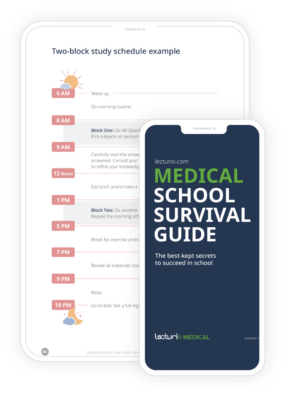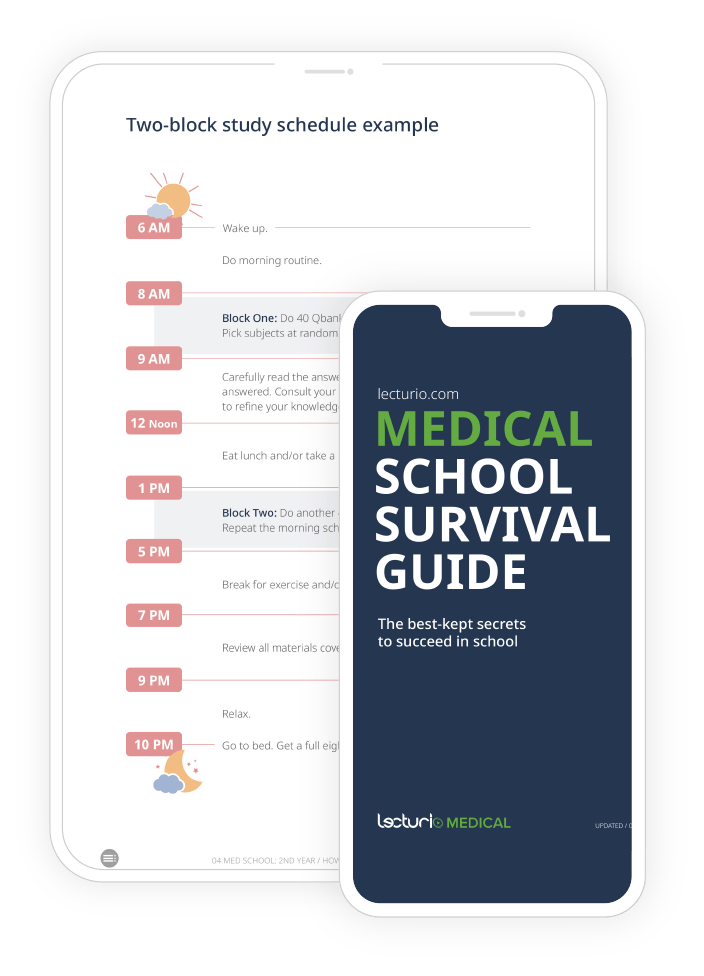Many people have their own reasons to work while in medical school. Whether it’s something they’re passionate about, or they simply want to earn something on the side, there are part-time jobs available to medical students. In this article, we’ll go through the reasons why (and why not) to work, the jobs that might fit what you’re looking for, and how to balance these with medical school. So let’s get into it!
To Work or Not to Work
Right now, you might be weighing your pros and cons on whether you should work or not. You might also be wondering what important things you’ll have to sacrifice to make time for work and studying. Maybe you need to work part-time, but you find it intimidating. That’s all fine, since it’s a big decision to balance medical school and a job.
Choosing to get a part-time job was certainly an important decision for me. During the COVID-19 pandemic, money and healthcare suddenly became a lot harder to come by. Many of us had to step up to help support ourselves, our families, and our communities – and I did too. So, I ended up doing part-time work to pay for any extra expenses I had while volunteering in medical settings, too.
Why work part-time?
With the funds it takes to pay the tuition, living expenses, and resources for studying, many of us find ourselves with less in our bank accounts than we’d like. To fill that gap, working part-time is a reasonable solution. Another reason to work part-time is that it adds to our resumes and medical knowledge. As such, many students work in research, medical settings, and even outreach programs whenever they have the time.
Lastly, having a job teaches you skills you won’t learn in the classroom.
You’ll learn to work with others, set expectations in the workplace, and manage your time and resources better. It may not seem relevant in the classroom, but when you start working as a doctor, you’ll already have a feel of how you should treat your co-workers and how they should treat you. For me, getting a job has helped me get into a rhythm between work, study, and personal time, and my time management skills have gotten much better!
Why not?
We’ve already established that medical school is demanding. It always seems that you have too little time for all the things being asked of you. Apart from being mentally and physically draining, it can also be emotionally draining. You’ll be making use of mental energies even on days when you think you don’t have any energy left. There will be moments when it feels too hard to continue with medical school, so why add more with a part-time job?
If you’re someone who has trouble with time management, a hard time working with others, or other time-consuming commitments, I wouldn’t recommend getting a part-time job until you get those fixed first. Why? When you miss a few hours of studying, it’s your own grades that get affected. However, when you get a job, you’ll need to commit more of yourself because you’re working for and with other people. That pressure can get intense, and sometimes your studies are affected. If you’re not okay with that, you might want to adjust your expectations about work, find a lighter part-time job, or look for financial alternatives.
In the end, it’s all about which job fits your lifestyle. Different schools have different schedules and approaches to teaching their students. Some schools might provide more free time than others. Some schools might not feel as draining as others.
So, think about whether you still have time and resources to spare if you really want to work part-time, because medical schools don’t offer night classes!
Top 5 Part-time Jobs for Medical Students
Once you’ve decided that you’re willing to work and found space for it in your schedule, it’s time to think about what work you want to do. Below we have some part-time jobs you can consider as a medical student. In no particular order, I included these jobs based on their relevance, ease, flexibility, and salary.
#1 Assist in a hospital or any medical setting
With a salary of $12–20/hour for 10–15 hours per week, you can work as an orderly, technician, care aide, or a scribe during your off hours in medical school. It’s nice because you’ll be able to expose yourself to various cases and facets of patient care while also earning! However, the hours are less flexible. So when you need to be studying on important nights, you’ll have to find a way to reduce your hours or deal with the reduced study time you’ll have.
You might also get sick of working in a hospital by the time you start doing actual rounds. If you don’t enjoy that kind of work, there are online alternatives. During the pandemic, I did part-time work with online patient monitoring for those isolating at home with COVID-19 infections. It paid well and I got to learn more about managing patients. So if you’re passionate about medicine, a practical learner, or just love working with patients, then this part-time job is for you!
#2 Tutoring
Have you ever considered giving back to students like you who are struggling with their college degrees or even getting into medical school? You could earn up to $100 an hour teaching students like you on how to pass the MCAT or your own country’s equivalent. You can also teach non-medical related courses online for $20-30 an hour on any topics of your expertise.
The best part is that the hours are flexible as long as you and your students agree to the schedule. The main challenge will be making time for your student’s needs and having the mental energy to study and teach. Another challenge is that not everyone is good at teaching. However, it’s a skill you can always learn! So if you want to give back, or just want to try your hand at teaching, consider tutoring.
#3 Writing
If you consider yourself good at expressing yourself through writing, you might want to take up a side job as a writer or an editor. At $50-100 for every article, you can earn in your free time. While it does take some time to formulate what you want to write and how to go about it, writing is a skill that gets faster as time goes by.
There are a lot of freelancing sites where students like you can find jobs as a content writer, editor, and even blog writing through sites like Upwork and Fiverr. These are sites where companies and individuals can ask for the assistance of freelance writers. Personally, I chose writing as my main part-time job because I had a good background in writing and it was something I already did in my free time. I find it calming to write during my breaks. However, take note that freelance writing is a competitive field, so know your strengths when looking for jobs and which topics you’re best suited for.
#4 Research Assistant
If you’re interested in a specific field and want to take part in furthering science, you can sign up to be a research assistant or even a writing assistant. For around $15–25 per hour, you can put your pre-med degree to use by helping people in your field do their research. It might even be a great addition to your resume!
Of course, this job also demands a lot of mental effort that you may need to save for studying medicine. I did similar jobs while I was in medical school using my professional license and degree. I found it quite interesting since it was a field that I enjoyed, so it didn’t feel like I was sacrificing too much. Working with medical-related research will also help with your studies.
#5 Business
Starting a business of your own and managing it in medical school is hard, but not impossible. I’ve had classmates start small businesses from hobbies like art and baking, while others invested in businesses to make money for more long-term returns. The challenge is that businesses usually need starting capital, and even after that, it’ll take time for you to see the return on your investment.
However, it’s still worthwhile to have a business on the side because over time, you’ll find yourself earning in your sleep. Sure, managing a business on the side with medical school is hard, especially when you have no management background. But with the right guidance and careful planning, you can start small and grow your business as time goes by.
Bonus: volunteer work
At a time when healthcare issues are rampant, there are many avenues to volunteer and help others. Actually, even without the pandemic, there will always be people who need help– whether it’s healthcare-related or another problem in your community. I used to not volunteer for anything before the pandemic started because I thought my studies were more important and I couldn’t just sacrifice the time.
Unfortunately, it wasn’t until I saw how much the people around me needed it that I started helping with relief and healthcare efforts around my city. It was fulfilling and helped me solidify why I wanted to become a doctor. In working with actual people in practical settings, you’ll really feel like you’re doing your part in making a difference. Even just as a medical student or intern, you’ll find many people looking up to you for guidance about things they don’t understand.
Volunteering may not seem enticing at first glance (because it usually doesn’t pay money), but there are other rewards. If you’re looking for part-time work simply to learn more, immerse yourself in the community, or gain a new perspective in life, I encourage you to try it out.
How to Balance Medical School and Work
Balancing medical school and work is hard. The keyword here is balance. It’s like walking a tightrope and getting a feel for each side, so that you don’t fall over completely. You’ll be exhausting your personal resources in exchange for financial and academic ones. Sounds tough, right? It is, but it doesn’t always have to be. Here are some quick tips for doing part-time work with medical school.
1. Set goals
Before finding a job that fits you, think about what you need. How much money are you looking to earn? Is there something you want to pay for? Are you trying to improve your resume? What are you willing to sacrifice for it? There are a lot of personal things to consider, and different jobs will help with different goals.
2. Organize your things
Working part-time requires a lot of organizing. You can’t just stumble through your books to study anymore, either. Your time needs to be spent efficiently. That’s why knowing what works for you in terms of studying and working is a sign that you’re probably ready to work part-time. So, keep a schedule for studies, work, and everything else in between so that you can follow it to a “T.” Planners are your new best friend!
I personally keep a few hours of leeway time in case an emergency comes up or I simply want more “me” time. I’m also very strict with my schedule.
Even if I’m not done studying, and my time is up, I stop.
In the same way you shouldn’t compromise your time for work and study, don’t compromise the break times you set for yourself.
3. Communicate
I always make sure that my supervisors know when something comes up. I ask them questions when I’m lost. I even ask for extensions when I need them. Always communicate when you’re working with other people because it’s also their work on the line if you fall short. This also applies with the work in medical school. If work needs to take precedence over your time to work on a group project, you need to let your classmates know.
4. Find a job that you can do remotely
Remote work is a lot easier to do now that everyone knows the vast potential of working from home. Meetings, paperwork, and other tasks can be done from the comfort of your own home. As such, in between your studies, you can accomplish your work tasks, too. For me, remote work helps me study better because it’s a well-deserved change in pace from staring at medical books. Instead of spending extra time traveling and setting up, it’s a lot more practical to have your own setup at home where you’re already studying.
5. Take some time off
As much as possible, get a job that provides some time to rest. You’re working a lot more than just as a medical student, so your need for rest is greater. You need to take time off working and studying. Work cannot count as rest from school, or the other way around. Remember that you’re not just a student and a part-time worker. You don’t have to always sacrifice your personal interests and restful times. Schedule times for breaks, sleep, and hobbies. Remember to breathe and recharge. You’ve definitely earned it!







